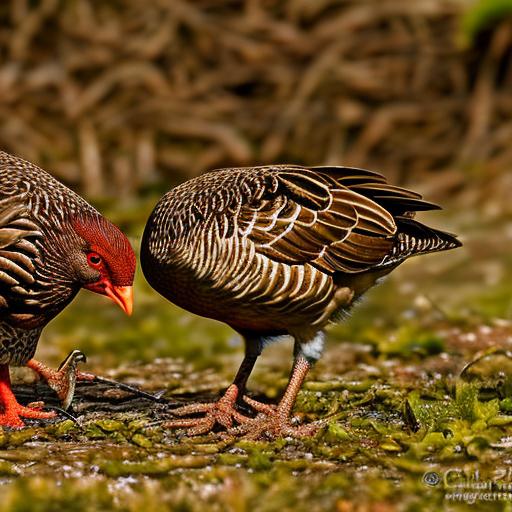Bronze Turkeys and Chickens are two popular poultry species that are commonly raised by farmers and homesteaders. Bronze Turkeys, also known as Broad-Breasted Bronze Turkeys, are a breed of domestic turkey that is known for its large size and flavorful meat. They have a rich, dark brown plumage with metallic bronze highlights, hence their name. Chickens, on the other hand, are a common domesticated bird that is raised for meat and eggs. They come in various breeds and colors, with the most popular being the Rhode Island Red and the Plymouth Rock.
Both Bronze Turkeys and Chickens are popular among farmers and homesteaders for several reasons. Firstly, they are relatively easy to raise and require minimal maintenance. They are hardy birds that can adapt to a wide range of climates and environments. Secondly, they provide a sustainable source of food for the farmer or homesteader. Bronze Turkeys are known for their delicious meat, while Chickens provide both meat and eggs. Lastly, they can be a profitable venture for those looking to sell their products. The demand for locally raised, organic poultry is on the rise, making Bronze Turkeys and Chickens a lucrative option for farmers.
Key Takeaways
- Bronze turkeys and chickens can be kept together in the same living environment.
- Keeping them together can provide benefits such as pest control and social interaction.
- Understanding the temperament of both species is important to prevent aggression and fighting.
- Creating an ideal living environment includes providing adequate space and shelter.
- Feeding requirements should be tailored to the specific needs of each species.
Benefits of Keeping Bronze Turkeys and Chickens Together
Keeping Bronze Turkeys and Chickens together can have mutual benefits for both species. Firstly, they complement each other in terms of foraging. Bronze Turkeys are excellent foragers and can help control pests in the area. They have a keen eye for spotting insects and small rodents, which they will eagerly consume. Chickens, on the other hand, are great at scratching the ground and turning over soil in search of food. This can help expose pests that may be hiding in the soil, making it easier for the turkeys to find them.
Additionally, keeping Bronze Turkeys and Chickens together can help create a more balanced ecosystem on the farm or homestead. Turkeys and chickens have different feeding habits and preferences, which means they won’t compete for the same resources. Turkeys prefer to eat grass, seeds, and insects, while chickens enjoy a diet that includes grains, vegetables, and insects. By having both species on the property, you can ensure that all available food sources are being utilized efficiently.
Understanding the Temperament of Bronze Turkeys and Chickens
Bronze Turkeys and Chickens have different temperaments that need to be managed to prevent aggression and fighting. Bronze Turkeys are known to be more territorial and aggressive compared to chickens. They can become protective of their space and may exhibit aggressive behavior towards other birds, especially during breeding season. Chickens, on the other hand, are generally more docile and social. However, they can also display aggression towards each other or towards turkeys if they feel threatened or if there is competition for resources.
To manage their behavior and prevent aggression, it is important to provide adequate space for both species. Overcrowding can lead to increased stress and aggression among the birds. Additionally, providing separate feeding areas can help minimize competition for food. It is also important to observe the birds regularly and intervene if any signs of aggression or fighting are observed. Separating birds that are displaying aggressive behavior can help prevent injuries and maintain a peaceful coexistence between the two species.
Creating the Ideal Living Environment for Bronze Turkeys and Chickens
Creating the ideal living environment for Bronze Turkeys and Chickens involves providing suitable housing and adequate space for both species. Bronze Turkeys require a larger living space compared to chickens due to their size. A turkey coop should have a minimum of 10 square feet per bird, while a chicken coop should have at least 4 square feet per bird. The coops should be well-ventilated and provide protection from predators and the elements.
In terms of shelter, both turkeys and chickens require roosting areas. Turkeys prefer to roost on low branches or platforms, while chickens prefer elevated roosting bars. Providing separate roosting areas for each species can help prevent competition and aggression. Additionally, both species require nesting boxes for laying eggs. These should be placed in a quiet and secluded area to provide privacy for the birds.
Feeding Requirements for Bronze Turkeys and Chickens
Bronze Turkeys and Chickens have different dietary needs that need to be met to ensure their health and productivity. Bronze Turkeys require a diet that is high in protein to support their growth and muscle development. They should be fed a commercial turkey feed that contains at least 20% protein. Additionally, they can be supplemented with fresh fruits, vegetables, and insects to provide variety in their diet.
Chickens, on the other hand, require a balanced diet that includes grains, vegetables, and protein sources. They can be fed a commercial chicken feed that contains around 16% protein. Additionally, they can be given kitchen scraps, fruits, vegetables, and insects as treats. It is important to provide a constant supply of fresh water for both species.
To ensure that both turkeys and chickens are getting the appropriate nutrition, it is recommended to provide separate feeding areas for each species. This will prevent competition for food and allow each bird to eat at their own pace.
Health Concerns to Consider When Keeping Bronze Turkeys and Chickens Together

When keeping Bronze Turkeys and Chickens together, there are several health concerns that need to be considered. Both species are susceptible to common poultry diseases such as respiratory infections, parasites, and bacterial infections. It is important to practice good biosecurity measures to prevent the spread of diseases between the birds.
Regular health checks should be conducted to monitor the birds for any signs of illness. Any sick or injured birds should be isolated and treated accordingly. Additionally, providing a clean and sanitary living environment is crucial for preventing the spread of diseases. Coops should be cleaned regularly, and bedding should be replaced to prevent the buildup of bacteria and parasites.
Preventing Aggression and Fighting Between Bronze Turkeys and Chickens
To prevent aggression and fighting between Bronze Turkeys and Chickens, it is important to manage their behavior and provide a suitable living environment. As mentioned earlier, providing adequate space and separate feeding areas can help minimize competition and aggression. Additionally, providing enrichment activities such as perches, toys, and dust bathing areas can help keep the birds occupied and reduce stress.
It is also important to observe the birds regularly for any signs of aggression or fighting. If any birds are displaying aggressive behavior, they should be separated from the group to prevent injuries. Introducing new birds slowly and gradually can also help minimize aggression. This can be done by keeping the new birds in a separate enclosure within sight of the existing flock for a period of time before allowing them to interact.
Benefits of Raising Bronze Turkeys and Chickens Together for Farmers
Raising Bronze Turkeys and Chickens together can have several economic benefits for farmers. Firstly, it allows farmers to diversify their product offerings. By raising both turkeys and chickens, farmers can cater to a wider range of customers who may have different preferences for meat or eggs. This can help increase sales and profits.
Additionally, raising both species together can help maximize the use of resources on the farm. As mentioned earlier, turkeys and chickens have different feeding habits and preferences. By having both species on the property, farmers can ensure that all available food sources are being utilized efficiently. This can help reduce feed costs and increase overall productivity.
Tips for Successfully Introducing Bronze Turkeys to a Chicken Flock
Introducing Bronze Turkeys to an existing chicken flock should be done slowly and carefully to minimize stress and aggression. Firstly, it is important to quarantine the new turkeys for a period of time before introducing them to the flock. This will allow the turkeys to be observed for any signs of illness and prevent the spread of diseases to the existing flock.
When introducing the turkeys to the flock, it is recommended to do so gradually. This can be done by keeping the turkeys in a separate enclosure within sight of the chickens for a period of time. This will allow the birds to become familiar with each other without direct contact. After a few weeks, the turkeys can be allowed to interact with the chickens under supervision. It is important to monitor their behavior closely and intervene if any signs of aggression or fighting are observed.
The Viability of Keeping Bronze Turkeys and Chickens Together
In conclusion, keeping Bronze Turkeys and Chickens together can be a viable option for farmers and homesteaders. Both species have their own unique benefits and challenges, but when managed properly, they can complement each other and provide a sustainable source of food and income.
By understanding the differences in temperament, providing suitable housing and feeding requirements, and practicing good biosecurity measures, farmers can successfully raise Bronze Turkeys and Chickens together. The key is to provide adequate space, separate feeding areas, and regular observation to prevent aggression and ensure the health and well-being of both species.
Overall, raising Bronze Turkeys and Chickens together can be a rewarding venture that offers economic benefits, promotes sustainable farming practices, and provides a diverse range of products for consumers.
If you’re considering keeping bronze turkeys with chickens, it’s important to understand the specific requirements and considerations involved. Poultry Wizard offers a helpful article on “Do Turkeys Need a Coop?” which provides valuable insights into providing suitable housing for turkeys. Additionally, their article on “Turning a Shed into a Chicken Coop” offers practical tips for converting existing structures into chicken coops, which can be useful when creating separate spaces for turkeys and chickens. For those looking for inspiration on building a large chicken coop that can accommodate both species, Poultry Wizard’s article on “Large Chicken Coop Ideas” offers creative ideas and design suggestions. Check out these informative articles to ensure the successful cohabitation of bronze turkeys and chickens.
FAQs
Can you keep bronze turkey with chickens?
Yes, it is possible to keep bronze turkeys with chickens.
Will the turkeys harm the chickens?
Turkeys are generally not aggressive towards chickens, but it is important to monitor their behavior and ensure that they are not causing any harm.
What should be the ratio of turkeys to chickens?
The recommended ratio is one turkey for every six to eight chickens.
Do turkeys and chickens have the same dietary requirements?
No, turkeys and chickens have different dietary requirements. It is important to provide them with separate feed and water sources.
Can turkeys and chickens share the same coop?
It is not recommended to house turkeys and chickens in the same coop as turkeys require more space and ventilation than chickens.
What are the benefits of keeping turkeys with chickens?
Keeping turkeys with chickens can provide a diverse and sustainable source of meat and eggs. Turkeys can also help control pests and weeds in the garden.
Meet Walter, the feathered-friend fanatic of Florida! Nestled in the sunshine state, Walter struts through life with his feathered companions, clucking his way to happiness. With a coop that’s fancier than a five-star hotel, he’s the Don Juan of the chicken world. When he’s not teaching his hens to do the cha-cha, you’ll find him in a heated debate with his prized rooster, Sir Clucks-a-Lot. Walter’s poultry passion is no yolk; he’s the sunny-side-up guy you never knew you needed in your flock of friends!







